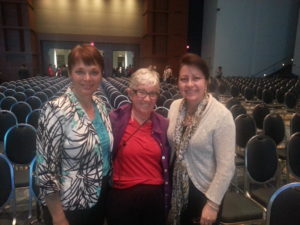First of all, my mom is the most incredible person I know.
My friend and boss Leora Itman somehow managed to create a website for Twin Cities Jews that grew big enough and strong enough to be able to hire me as its Editor. Then she went and had a baby girl, while remaining a full-time lawyer, and somehow managed to also find time to “keep the lights on” at TC Jewfolk.
As a Minneapolis improviser I’m blessed to be able to interact daily with an incredible group of talented, funny, smart women improvisers, led by my friend and mentor Jill Bernard.
I can unequivocally state that I wouldn’t be the man I am today without the amazing guidance and support of a whole legion of women.
I guess you could say I’m a feminist. (I guess I will say I’m a feminist.)
The grassroots lobbying organization J Street has a main goal to find a two-state solution for Israelis and Palestinians. A lot of focus has been given at their national conference to the plight of the Palestinian people, the humanity on both sides of the conflict, and the desire from both sides for peace. To feel so strongly for peace, not just for Israel’s sake but for Palestine’s, requires a keen sympathy from J Street supporters for The Other. J Street as an organization doesn’t focus on women’s rights, but that ethos of sympathy for the Other extends not just from Jews towards Palestinians, but also from men towards women, and it’s been evident everywhere at this conference.
I attended a breakout session this morning titled, “The Changing Face of Politics in Israel: Will Women Lead the Way?” I’ll discuss more of it later, but the panel mentioned how most halls of power, and most institutions in general, are still a “Boys Club.” J Street is not completely free of that charge (note that I still managed to unintentionally frame it as a “from men towards woman” conference in the above paragraph), but in my eyes they’ve done a commendable job of promoting women speakers and their ideas—certainly much better than the AIPAC conference did this past March.
I don’t mean to imply that AIPAC did a bad job; only that J Street did a better job. Each day of the three-day conference had a female keynote speaker, and only today’s, MK Zehava Galon, got overshadowed by a male speaker: Joe Biden, the Vice President of the United States. And Galon actually got a bigger ovation from the audience than Biden did! Take a look at the conference schedule and you’ll notice that almost every breakout session, and every plenary panel had at least one woman on it, no matter the topic being discussed.
On Saturday night, I got to meet two Minnesota state senators and one state representative. They’re here in Washington for a wholly different conference, but they decided to spend their one free night in D.C. attending the opening J Street plenary session with Tzipi Livni. Senate President Sandy Pappas (DFL-65), Senator Patricia Torres Ray (DFL-63), and Representative Phyllis Kahn (DFL-60B) are in Washington for the WiLL/WAND national conference, whose focus is on reducing violence and militarism, violence against women, and using gender violence as a weapon of war. A new project they just developed focuses on “working with international women parliamentarians from Afghanistan, Pakistan, and Northern Africa, to help them deal with issues in their country,” says Pappas.
They found a lot of parallels between J Street’s mission and the mission of WiLL/WAND, primarily that both organizations were focused on peace. “I believe women need to be at the peace table,” says Pappas, “So I’m very happy to see Tzipi Livni there.
“In fact there’s a UN Security resolution, 1325, that specifically states that women need to be involved in all stages of peace-making.” Her one disappointment in the peace process is that no Palestinian woman, like Dr. Hanan Ashwari, is at the table on the other side. “I think Hanan and Tzipi would get this solved very quickly!”
At the panel this morning, Robi Damelin, Israeli Spokesperson and Director of International Relations for The Parents Circle, said about the conflict, “Unless you understand the other side, you can… sign what you like, but it will be a ceasefire, not a peace.”
The panel consisted of Robi, two members of the Knesset—MK Ruth Calderon (Yesh Atid) and MK Merav Michaeli (Labor)—and Yael Patir, Director of Israel Programs at J Street. They talked about the conflict and about the peace process, but mainly they talked about the challenges of being a woman in a male-dominated society, and how that was doubly or even triply a challenge the higher up the halls of power they climbed.
They voiced lots of interesting examples and ideas about reaching out to others who usually get cast aside, about teaming up to make voices stronger, and even one crack at the temperature of the room, saying, “Air conditioning is now a women’s issue!”
But what I found most interesting, and most representative of the dilemma many career women seem to face was something said by MK Michaeli:
“As women, in Israel, we do not put our feminine identity and solidarity—nor by the way our motherhood—before our national identity. And as long as we don’t do that we cannot really cooperate and identify with other women. This is, I think, for us as women the biggest obstacle—the fact that we still first and foremost identify ourselves with the community we belong to, and it is NEVER a women’s community.”
The tide seems to be changing, bit by bit. Not fast enough maybe, but at least enough for someone like Senator Torres Ray to feel welcomed and engaged on Saturday night: “You did something wonderful tonight. I was incredibly inspired.”


